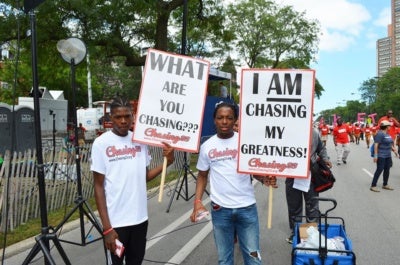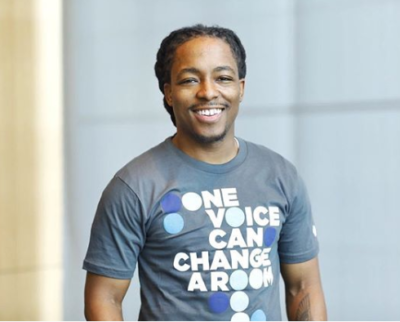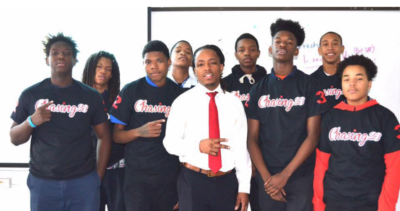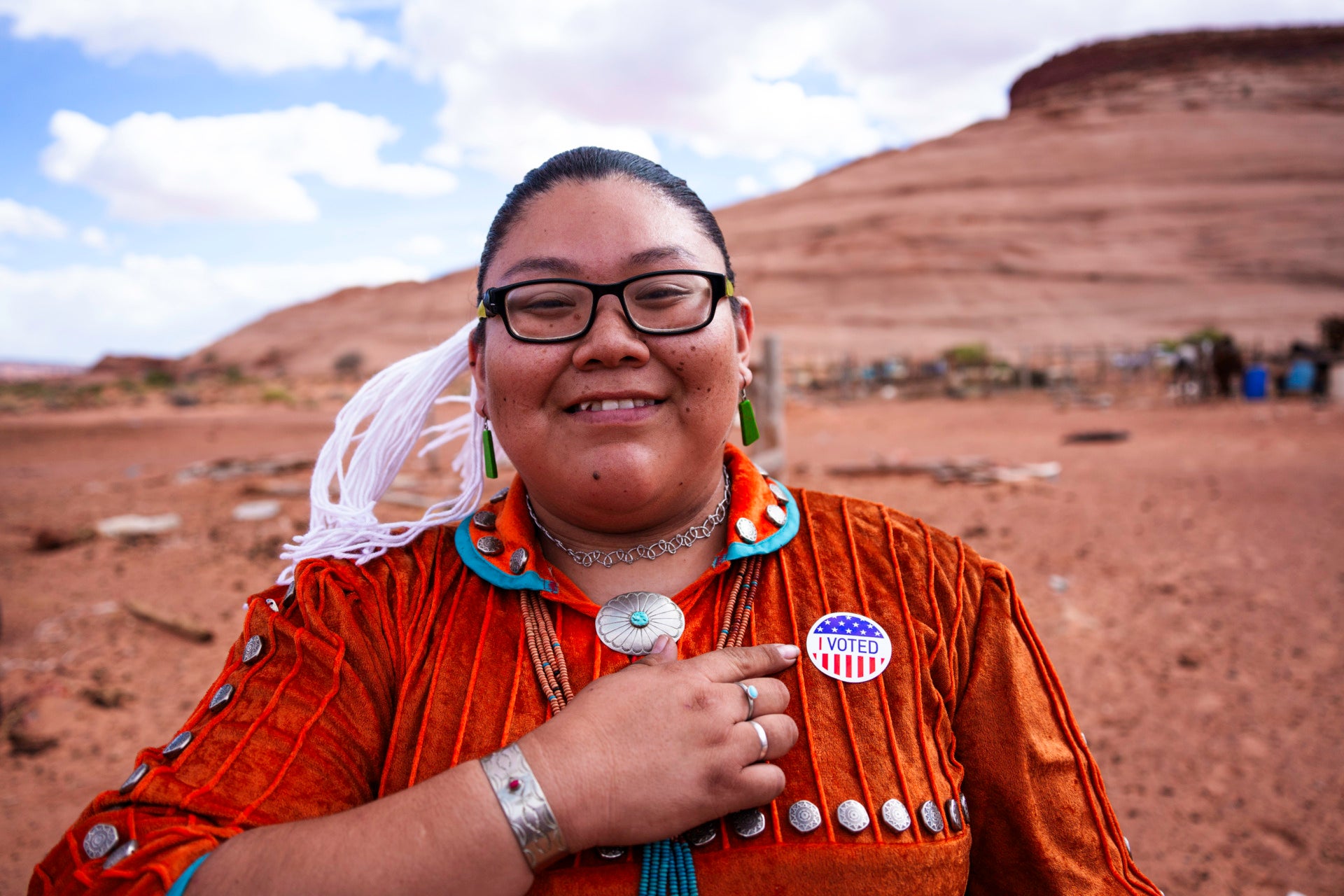![]()
How do we change? How do we honor the dead?
The final time Darius Ballinger spoke to his mentor, Wayne Drummer, was April 12th, 2013—the day of Ballinger’s 22nd birthday. Ballinger had spent the day in court, pleading guilty to a felony charge and assuming he was about to spend several years in prison. Drummer, with his typical glass-half-full perspective, had predicted otherwise, and he’d been correct: Ballinger was sentenced to 90 days in jail and two years of probation.
The phone call between Ballinger and Drummer later that day was celebratory, and they made plans to see one another. But that meeting would never happen. “I woke up the next morning to a phone call from a friend saying something went wrong with Wayne,” Ballinger told me. “Hours later, I saw his picture on Instagram, [with the quote] ‘RIP Wayne.’” Ballinger Googled his mentor’s name, soon arriving at the headline “23-year-old Chicago man fatally stabbed to death.” Drummer had been murdered by his girlfriend, an active airwoman in the US Air Force.
 Ballinger shared this with me because I’d asked why his empowerment group for young black men was called Chasing23. Two things were striking about Ballinger as he answered. The first was that he was serious and sad but spoke so openly I forgot most people don’t tell strangers about jail time and losing their closest friends. The second was how in touch with being a teenager he was. He mentioned a night, ten years prior, when he was 17 and watching The Pursuit of Happyness, a Will Smith movie based off the life of Christopher Gardner and his transition from homelessness to a successful career in finance. “At seventeen, I felt like I was at rock bottom,” Ballinger said, “some aspect of me was empty.” He’d never worked through losing his father to a seizure at age five, had been arrested and expelled from high school, and had suffered through the murders of three friends. In Pursuit, Ballinger saw someone who had hit the lowest point in his life, but then rebounded and attained happiness. He remembers being inspired to press on through adversity by the movie, just by virtue of seeing a black man portrayed in a role other than criminal, athlete, or entertainer—the main options for his future he’d seen seen in the media and during his youth on the South Side of Chicago.
Ballinger shared this with me because I’d asked why his empowerment group for young black men was called Chasing23. Two things were striking about Ballinger as he answered. The first was that he was serious and sad but spoke so openly I forgot most people don’t tell strangers about jail time and losing their closest friends. The second was how in touch with being a teenager he was. He mentioned a night, ten years prior, when he was 17 and watching The Pursuit of Happyness, a Will Smith movie based off the life of Christopher Gardner and his transition from homelessness to a successful career in finance. “At seventeen, I felt like I was at rock bottom,” Ballinger said, “some aspect of me was empty.” He’d never worked through losing his father to a seizure at age five, had been arrested and expelled from high school, and had suffered through the murders of three friends. In Pursuit, Ballinger saw someone who had hit the lowest point in his life, but then rebounded and attained happiness. He remembers being inspired to press on through adversity by the movie, just by virtue of seeing a black man portrayed in a role other than criminal, athlete, or entertainer—the main options for his future he’d seen seen in the media and during his youth on the South Side of Chicago.
Ballinger says Drummer was another reminder in his life that “that there could be more for me.” Drummer would speak to Ballinger about how young black men could chase their greatness, like Michael Jordan, the Chicago Bull’s number 23. Despite the MJ connection, when Drummer said greatness, he didn’t mean sports ability, and he didn’t mean financial success. “Greatness [was] loving your mom, respecting your girl, having empathy with your friends and the neighborhood around you,” Ballinger told me. “Greatness [was] thinking beyond the status quo.” It included the idea that black men could be social workers, financial advisors, public servants, and civic leaders. Leading up to Drummer’s twenty-third birthday, the two began throwing around the phrase Chasing23, not as a name for an empowerment group, just as an idea—maybe a brand name—connected to rewriting the narrative for young men of color. At the time, Ballinger believed he should be chasing the type of greatness Drummer spoke about, but he couldn’t get himself to do it. Then Drummer was murdered—at age 23. “Wayne’s transition affirmed something in me,” Ballinger said. “That sense of got to challenge my current trajectory, the narrative I was in and brought into.” With precisely one year until his own twenty-third birthday, Ballinger set out to change his life.
 Ballinger told me that when he’d entered jail, he was a high school dropout who’d attended only failing schools, a person who’d fathered two sons as a teenager, and was already in possession of a criminal record. Like most of us, the narrative in Ballinger’s head about what happened to someone with resume points like his didn’t include walking out of jail into a brighter future. But six years after Ballinger’s release, he was running a successful nonprofit—Chasing23—and he’d had a one-on-one with former President Barack Obama, who’d said how much Ballinger’s story inspired him.
Ballinger told me that when he’d entered jail, he was a high school dropout who’d attended only failing schools, a person who’d fathered two sons as a teenager, and was already in possession of a criminal record. Like most of us, the narrative in Ballinger’s head about what happened to someone with resume points like his didn’t include walking out of jail into a brighter future. But six years after Ballinger’s release, he was running a successful nonprofit—Chasing23—and he’d had a one-on-one with former President Barack Obama, who’d said how much Ballinger’s story inspired him.
The way all this happened, Ballinger says, is that after he decided to chase Drummer’s type of greatness, “everything was one step next to the ‘nother, a domino effect.” He obtained his GED and enrolled at Kennedy King College to get his associate’s. He tried out student clubs, enjoyed student government, was elected SGA president, and went down to Springfield for an advocacy day. There, for the first time in his life, he was shown the fundamentals of civic engagement, and saw that being involved wasn’t difficult.
Two years after his release from jail, Ballinger began to give motivational speeches at high schools about his experiences. When he saw the way his words resonated with young men, he realized his calling was to mentor young black men and boys. “I [was having] all these wonderful opportunities that allowed me to see the possibilities life could have,” he said, and he wanted youth trapped in his former narrative to see those possibilities too. By the time two more years had passed, Ballinger had created his own mentoring and youth empowerment nonprofit tailored to the needs of his community—and called it Chasing23.
Throughout, Ballinger has been thinking of ways to commemorate Drummer beyond the usual night of toasting and drinking his friends have done for the people they’ve lost. This past year, he established the Wayne Marion Drummer Annual Scholarship. Chasing23 intends to give the first award to Drummer’s son.

Photo found via On The Table – Chicago Community Trust
Chasing23’s fifteen current members meet twice a week at the Bronzeville Community Clubhouse. On Mondays, they circle up, eat pizza, and talk about anything on their minds—from Brett Kavanaugh to Laquan McDonald to cars. Next, they collectively work through a curriculum on topics like conflict resolution and managing emotions, and then they break into one-on-one mentoring and tutoring. Wednesdays, they often leave the youth center to do project-based learning. Recently, they’ve organized a fundraiser basketball tournament, painted a CPS school, and registered voters. Somewhere between these Mondays and Wednesdays—along with the mentors’ daily text check-ins, Tuesday and Thursday visits to members’ classrooms, and availability for any emergencies in-between—the group bonds deeply. “Chasing23 is my effective family,” Kaywon Leonard, a graduate of the program told me, “That’s how I think of it. When you feel like nobody got your back, Chasing23 will help you.”
Since its inception, Chasing23 has worked with 40 young men and in close partnership with Wendell Phillips High School and the Juvenile Probation Department of Cook County. The young men Ballinger mentors say he’s changed their lives tangibly. “The first moment I met Darius,” Damarcus, one of Chasing23’s current members told me, “he gave me a different vibe. I don’t usually like people, but when I met Darius he brought out something better in me.” Damarcus said he’d felt this way because of how authentic Ballinger is—as he’d done with me, Ballinger had told Damarcus about his own incarceration, and his step-by-step path out of it. “I was incarcerated before, but [Ballinger] is doing good now since he been out of jail,” Damarcus said, “so I thought I probably could be like him and change my life around for the better.”
Damarcus said since entering his life, Ballinger has always been there for him. This past year, Damarcus’s older brother—his best friend, who’d helped raise him and provided for him and his mother—died of a sudden brain hemorrhage. Ballinger had come over to Damarcus and his mom’s apartment, sat down with them at their kitchen table. Damarcus remembers the things Ballinger said: that his brother was in a better place, that he was inside Damarcus, would live through him. As weeks passed, Ballinger had texted Damarcus daily as per usual, and they’d gone out for long meals, just talking. “He helped me deal with my grief, and I thank Darius for that, because I never had nobody else help me do that.”
When after his brother’s death, Damarcus and his mom were behind on rent, Ballinger had driven Damarcus from one restaurant to another showing him how to fill out job applications and speak professionally with management, get a job despite his record. Before Damarcus found a job at Portillo’s, Ballinger had paid the rent for them.
When I asked Ballinger what he finds challenging in his work, he told me the work was worth it, and that he sleeps well at night knowing he’s acted on his responsibilities and his calling, but there are moments—just moments—when it can feel hopeless. The main problem, he said, is that he and his mentees exist within larger socioeconomic and racial systems that “have much more impact on these individuals than I do.”
However, Ballinger has begun working to address these larger systems as well. He’s trying to change policy in Chicago, specifically as it impacts young men and boys, and is currently head of the youth design team for the Chicago branch of the Kellogg Foundation’s Truth, Racial Healing, and Transformation Initiative. Under his leadership, youth have been so much more vocal and involved than anticipated that the foundation has earmarked additional funds for Ballinger’s team.
Ballinger is also kept going by victories along the way: “This past year three of my guys graduated. And I didn’t graduate high school. It was a very affirming moment—to be there, and for them to be like, ‘I want to give recognition to my mentor.’ I think that was the moment of like ‘this is what’s up man.’ I helped other people do what I didn’t do. I won.”

